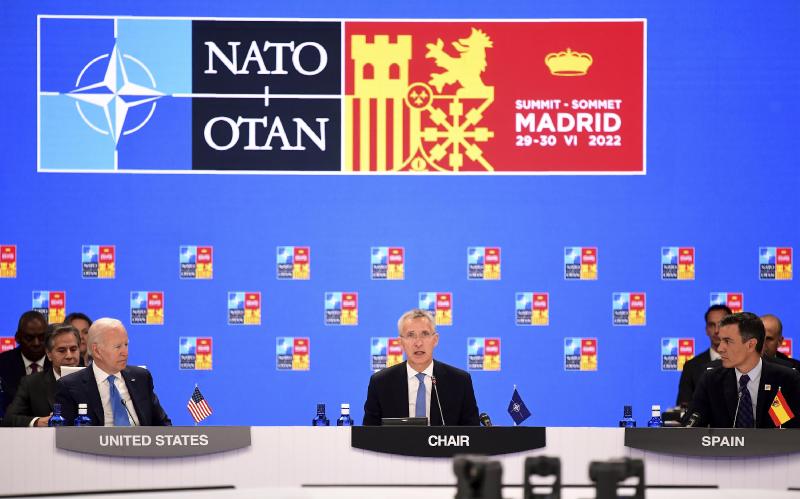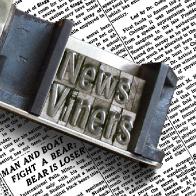NATO calls Russia its 'most significant and direct threat'
By: JILL LAWLESS, JOSEPH WILSON and SYLVIE CORBET J (AP NEWS)


No, Russia is not the 'most significant and direct threat' to NATO or Europe. The Russian invasion of Ukraine has only allowed Europe to kick the can farther down the road.
The greatest existential threat to NATO and Europe is division, dissent, and internal acrimony. Russia has only provided a common enemy that forestalls confronting the real threat. The United States and Europe have embraced a costly, prolonged regional war that can be easily contained to avoid confronting the issues raised by Brexit. European politics has created an incentive to prolong the Ukrainian war as long as possible.
Kicking the can only requires constantly throwing money at a distraction while assiduously avoiding any sort of diplomatic framework to end the war. The demand for unconditional surrender by non-combatant Europe provides an unifying political stability for NATO and the EU into the foreseeable future. Only Ukraine must suffer to maintain political unity in NATO and the EU. That's a convenient and well contained political excuse to kick the can.

MADRID (AP) — NATO declared Russia the "most significant and direct threat" to its members' peace and security on Wednesday and vowed to strengthen support for Ukraine, even as that country's leader chided the alliance for not doing more to help it defeat Moscow.
The military organization's condemnation was not wholly surprising: Its chief earlier said Russia's war in Ukraine had created Europe's biggest security crisis since World War II. But it was a sobering about-face for an alliance that a decade ago called Moscow a strategic partner.
Set up some 70 years ago to counter the Soviet Union, NATO held its summit in Madrid in a world transformed by Russia's invasion of its neighbor. The war drove the alliance to pour troops and weapons into eastern Europe on a scale not seen in decades and pushed Sweden and Finland to seek the safety of NATO membership.
The two formerly nonaligned nations were formally invited to join on Wednesday, as Secretary-General Jens Stoltenberg said the war had brought "the biggest overhaul of our collective defense since the end of the Cold War."
But Ukrainian President Volodymyr Zelenskyy lamented that NATO's open-door policy to new members did not appear to apply to his country.
"The open-door policy of NATO shouldn't resemble the old turnstiles on Kyiv's subway, which stay open but close when you approach them until you pay," Zelenskyy said by video link. "Hasn't Ukraine paid enough?"
He also asked for more modern artillery systems and other weapons and warned the leaders that they either had to provide Kyiv with the help it needed or "face a delayed war between Russia and yourself."
"The question is who's next? Moldova? Or the Baltics? Or Poland? The answer is: all of them," he said. "We are deterring Russia to prevent it from destroying us and from destroying you."
Zelenskyy has acknowledged that NATO membership is a distant prospect. Under NATO treaties, an attack on any of the 30 members would trigger a military response by the entire alliance, so it is trying to strike a delicate balance, letting its nations arm Ukraine without sparking a direct confrontation with nuclear-armed Russia.
At the same time NATO has moved quickly to ensure that its members are protected, dramatically scaling up military force along its eastern flank, where countries from Romania to the Baltic states worry about Russia's future plans.
It plans to increase almost eightfold the size of the alliance's rapid reaction force, from 40,000 to 300,000 troops, by next year. The troops will be based in their home nations but dedicated to specific countries in the east, where the alliance plans to build up stocks of equipment and ammunition.
U.S. President Joe Biden, whose country provides the bulk of NATO's military power, vowed the summit would send "an unmistakable message ... that NATO is strong and united."
"We're stepping up. We're proving that NATO is more needed now than it ever has been," said Biden. He announced a hefty boost in America's military presence in Europe, including a permanent U.S. base in Poland, two more Navy destroyers based in Rota, Spain, and two more F35 squadrons to the U.K.
Still, strains among NATO allies have also emerged as the cost of energy and other essential goods has skyrocketed, partly because of the the war and tough Western sanctions on Russia. There also are tensions over how the war will end and what, if any, concessions Ukraine should make.
Money remains a sensitive issue — just nine of NATO's 30 members currently meet the organization's target of spending 2% of gross domestic product on defense.
British Prime Minister Boris Johnson, whose country does hit the target, urged NATO allies "to dig deep to restore deterrence and ensure defense in the decade ahead."
At the summit, the leaders published NATO's new Strategic Concept, its once-a-decade set of priorities and goals.
The last such document, in 2010, called Russia a "strategic partner." At the time, the idea of Russia waging a land war on NATO's borders would have sounded far-fetched.
Now, NATO accused Russia of using "coercion, subversion, aggression and annexation" to extend its reach.
The document also set out NATO's approach on issues from cybersecurity to climate change — and the growing economic and military reach of China.
While it did not call China an adversary, NATO said Beijing's "stated ambitions and coercive policies challenge our interests, security and values."
"China does not share our values, and like Russia it seeks to undermine the international rules-based order," Stoltenberg said — though the alliance said it remained "open to constructive engagement" with Beijing.
For the first time, the leaders of Japan, Australia, South Korea and New Zealand attended the summit as guests, a reflection of the growing importance of Asia and the Pacific region.
NATO also stressed the need to address political instability in Africa's Sahel region and the Middle East — aggravated by "climate change, fragile institutions, health emergencies and food insecurity" — that is driving large numbers of migrants toward Europe. Host Spain and other European countries pushed for this new focus.
The summit, which ends Thursday, opened with one problem solved, after Turkey agreed Tuesday to lift its opposition to Sweden and Finland joining NATO.
NATO operates by consensus, and Turkish President Recep Tayyip Erdogan threatened to block the Nordic pair, insisting they change their stance on Kurdish rebel groups that Turkey considers terrorists.
After talks with leaders of the three countries, Stoltenberg said the impasse had been cleared.
The two countries' accession has to be ratified by all nations, but Stoltenberg said he was "absolutely confident" Finland and Sweden would become members quickly.
Finnish Foreign Minister Pekka Haavisto said his country was eager to get out of the "gray zone" of having applied for membership but not yet fully covered by NATO's collective defense guarantee.
"Our aim is that that period should be as short as possible," he said.




Ukraine is paying the price for European political divisions created by Brexit. Europe has an incentive to prolong the war in Ukraine as long as possible to kick the can.
Is Fox News is helping win over hearts and minds for Putin?
Wasn't Fox News skinning goats to make drums?
As for the seed you posted, the late Paul Harvey would have said: "And that's the REST of the story."
Love it when NATO accuses Russia of waging a land war their borders; when NATO/US have been flipping former Soviet states like they are Pogs. NATO expanded to Russia's border, not the other way around.
NATO/US have known since the 90's that Russia didn't appreciate the expansion; but kept right on with it. There have been treaties that sought to increase the trust and working relationship between NATO/US and Russia- but it was always a one way street. Russia was continually told to trust that US/NATO expansion wasn't a threat to them. Until it was.
The US didn't tolerate it when Russia wanted to put nuclear weapons in Cuba. We didn't want a threat that close to US borders. We also wouldn't tolerate it if Russia flipped Mexico; and started to build up their military and place them under Russia's nuclear umbrella.
Ask Serbia, Iraq, Syria, and Libya about NATO being a defensive pact only.
Europe today, tomorrow the world. (Where have I heard that before?)
I am not pro Russian or Chinese government. Hell some of my friends say I am not pro US government either.
History is repeating itself. The world is choosing sides. Land and resources are precious commodities to be divvied up to whomever can afford to seize and hold them. How much longer before we go past the tipping point?
I don't blame the citizens of any country. The governments on the other hand know damn well what they are doing. They are playing a game of brinksmanship and we all are the collateral damage.
Leonard Cohen's 'First we take Manhattan'.
LOL. Very good - but I meant the world, not Berlin.
From wikipedia:
Wikipedia: Tomorrow, the World!
Or as Putin would say, "Today Ukraine; tomorrow Europe."